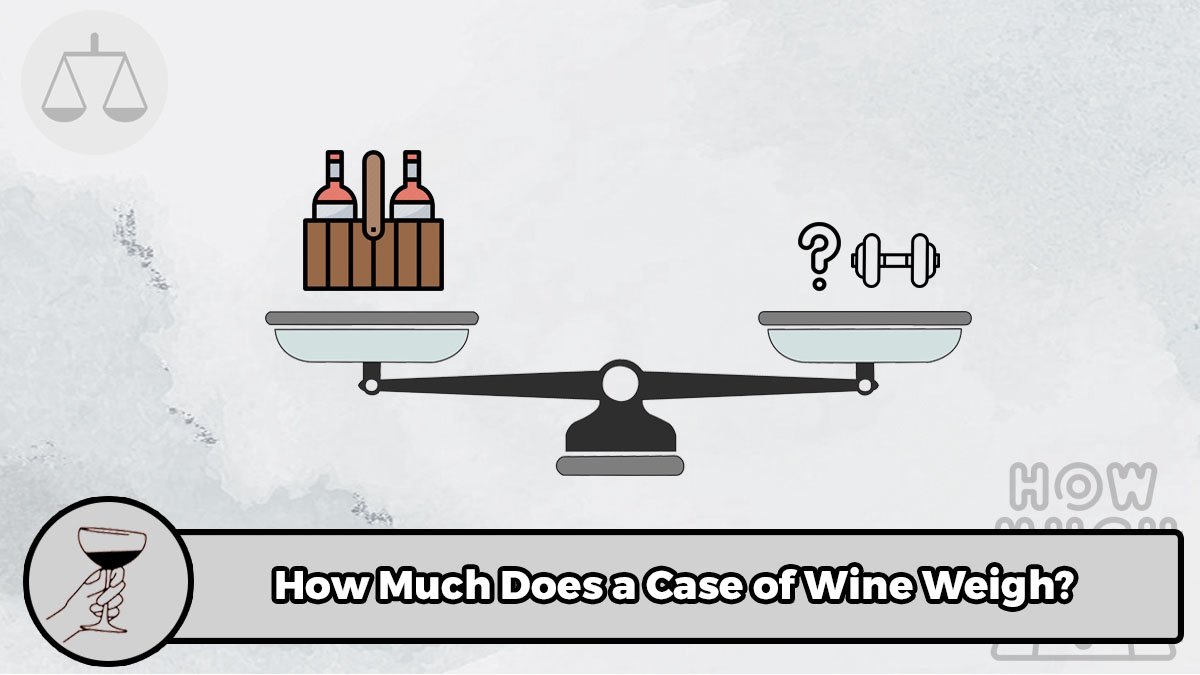How Much Does a Case of Wine Weigh?
Have you ever thought about purchasing a case of wine for a party or special occasion, but were left wondering how much it weighed? Weight is an important factor to consider when planning your trip to the store, as you may need help lugging it back home. Fortunately, we have done the research and are here to answer all of your questions!
In this blog post, we’ll discuss not only answering “How much does a case of wine weighs?“, but also give some helpful tips that will make carrying such an item easier. So grab yourself a glass and let’s begin our journey into the realm of heavy alcoholic beverages!
What is the Average Weight of a Bottle of Wine?
When it comes to the average weight of a bottle of wine, a few factors come into play. Most standard wine bottles hold about 750 milliliters of liquid, which usually translates to about 25 fluid ounces or 2.65 pounds. However, different shapes and sizes of wine bottles can affect their weight.
It’s worth noting that the weight of a wine bottle can also depend on the type of wine and the specific producer. Some winemakers use sustained glass bottles for their premium wines to a sense of luxury and quality. Additionally, some wineries have started using lightweight bottles to reduce their carbon footprint and shipping costs.
However, this is the weight when there is alcohol in the bottle. The amount of alcohol in the bottle makes up 1.65 pounds, which means an empty bottle of wine weighs only 1 pound.
Overall, the average weight of a standard 750-milliliter wine bottle is around 2.65 pounds, but the weight can vary depending on the specific bottle and its contents.
How Much Does a Case of Wine Weigh?
For wine aficionados and enthusiasts, knowing the weight of a case of wine can be important information to have, especially when it comes to purchasing and transporting wine. The weight of a case of wine can also vary depending on factors such as the type and style of wine, the size of the bottles, and the materials used in packaging.
Generally, a standard case of wine is made up of 12 bottles, each containing 750 milliliters (ml) of wine. This amounts to a total volume of 9 liters. The weight of the wine depends on its density, which can vary depending on the type of wine and its alcohol content. On average, a bottle of wine weighs around 2.65 pounds (1.2 kilograms), which means a case of 12 bottles would weigh approximately 31.8 pounds (14.4 kilograms).
Note: 31.8 pounds here is “the weight of 12 750ml bottles of wine“.
So, what is the weight of a case of wine (without a bottle)? The answer is about 5 pounds. That means a case of wine (containing 12 750ml bottles of wine) weighs about 39.2 pounds.
Why 39.2 pounds, not 12*2.65 + 5 = 36.8 pounds? You forgot one thing, it’s cork, and it weighs about 0.2 pounds. So we’ll have the calculation: 12*2.65 + 12*0.2 + 5 = 39.2 pounds.
Other factors that can impact the weight of a case of wine include the packaging materials used. Some wineries use heavier materials like wood or thicker cardboard, which can add to the weight of the case. In contrast, companies that specialize in wine shipping often use lighter-weight materials to reduce shipping costs.
It’s important to remember that the weight of a case of wine can also impact shipping costs and may necessitate special handling during transport. For example, airlines have specific weight limits for cargo, and exceeding these limits can result in additional fees. As such, it’s important to consider the weight of a case of wine when making purchasing and shipping decisions.
Factors That Affect the Weight of a Case of Wine
Contrary to popular belief, not all wine cases are created equal. Understanding the different factors that influence the weight of a wine case can help you make informed decisions and protect your investment. Now, we will explore some of the factors that affect the weight of a case of wine.
1. Bottle size: Bottle size is one of the primary factors that affect the weight of a wine case. Generally, larger bottles weigh more than smaller ones. This means that a case of 750 ml bottles weighs less than a case of magnum-sized bottles. The difference in weight might seem insignificant, but it can impact shipping costs and affect storage. If you’re looking to buy a case of wine, make sure you consider the size of the bottles.
2. Packaging: The packaging material used to transport and store a case of wine can affect its weight. Cases that come with foam inserts or dividers, for instance, can weigh more than those without. The type of packaging can also impact the level of protection afforded to your wine during shipping or storage. Therefore, you should pay attention to the packaging material used when buying a case of wine.
3. Wine Style: Different wine styles have different weights, which can impact the weight of a case. For instance, dense and full-bodied wines usually weigh more than light and fruity varieties. The style of wine you choose can, therefore, determine the weight of a wine case. It’s essential to consider this if you’re planning to transport or store your wine at home.
4. Glass thickness: The glass thickness of wine bottles can also affect the weight of a case. Wines sealed in thicker bottles are heavier than those in regular bottles. This can impact storage, transportation, and shipping costs. If you’re looking to buy a case of wine, it’s essential to factor in the thickness of the glass.
5. Closure type: Different wine bottles come with different closure types, which can impact the weight of a wine case. For instance, wines that come with a cork closure are usually heavier than those with a screw top. The closure type can affect storage and shipping costs. Make sure you consider the closure type when purchasing a case of wine.
Purchasing a case of wine can be a significant investment. Understanding the different factors that impact the weight of a wine case can protect your investment and ensure that you get the best value for your money. Bottle size, packaging, wine style, glass thickness, and closure type are among the critical factors that you should consider when buying wine. With this knowledge, you can make informed decisions and ensure that your wine is well-protected during storage and shipping.
Read more: how many bottles are in a case of wine?
How Much Do 24 Bottles of Wine Weigh?
Wine aficionados and distributors need to understand the weight of wine bottles for various reasons, such as transport, storage, and sales. The weight of a bottle of wine depends on several factors, including the type of wine, bottle size, and closure type.
On average, a standard 750ml bottle of wine weighs around 2.65 pounds (1.2 kg). This weight may vary depending on the bottle’s shape, the thickness of the glass, and the type of cork or cap used to seal the bottle.
If you’re looking to calculate the weight of 24 bottles of wine, you must consider the total weight of the bottles and the wine inside. Assuming a standard 750ml bottle of wine, 24 bottles will weigh approximately 63.6 pounds (28.8 kg) in total.
However, if you’re dealing with a different bottle size, such as a magnum (1.5 liters) or half-bottle (375ml), the weight will vary accordingly.
It’s important to note that the weight of wine bottles and cases can significantly affect shipping and handling costs. Distributors and retailers often calculate these expenses to determine pricing and margins for their products, making the weight of wine bottles an essential aspect of the industry.
How Many Cases of Wine Can You Put in a Pallet?
In general, a standard pallet measures 48 inches by 40 inches and can hold up to 56 cases of wine. However, this number may be influenced by the size of the wine bottles, as larger bottles will take up more space and may reduce the number of cases that can fit on the pallet.
Overall, it’s important to consider the size and weight of the wine bottles, as well as any regulations in place, when determining how many cases of wine can be placed on a pallet. A properly-loaded pallet can help ensure the safe and efficient transportation of wine from one location to another.
How Much Does a Pallet of Wine Weigh?
As noted above, one pallet will hold 56 cases of wine, so a pallet of wine weighs approximately 2195.2 pounds. However, the weight may vary depending on the type of wine, packaging, and bottle size. For instance, a pallet of Champagne bottles will be comparatively heavier than a pallet of Pinot Noir due to the thicker glass and heavier bottles.
Additionally, the weight of the pallet itself should also be taken into consideration, as it can add about 60 pounds to the total weight. Therefore, it is crucial to ensure that the weight of the pallet is factored into any shipping or handling calculations.
FAQs
How many bottles of wine are in a case?
A case of wine typically contains 12 bottles, but this can vary depending on the type and size of the bottle. For example, some cases may contain 6 large-sized bottles, while others may contain 24 smaller ones. It is best to check with your supplier before making a purchase.
What is the standard size of a wine bottle?
The standard size of a wine bottle is 750 milliliters, also referred to as the ‘standard’ or ‘regular’ bottle. This size has been widely adopted internationally, in part due to its convenience when storing and shipping. The average amount that a bottle of wine contains is 5 glasses, although this can vary depending on the serving size of each glass. In addition to the 750ml standard size, there are other common sizes available such as magnums (1.5L) and half bottles (375ml).
As you explore different types of wines from around the world, you will find many varieties that come in different shapes and sizes. Whether it’s a standard-size bottle or something more unique like a jeroboam, the bottom line is that it’s the contents inside that matter most. So go ahead and enjoy a glass of your favorite wine!
How much does a cork of wine weigh?
A cork of wine weighs approximately 0.2 pounds. However, the weight of a cork can vary depending on its size and density. For example, corks made from agglomerated cork (a combination of natural and recycled granules) tend to be heavier than those made from 100% natural cork. Additionally, corks used for sparkling wines tend to be thicker and therefore weigh more than those used for still wine.
The weight of a cork is an important factor in considering how airtight the seal will be and how much oxygen will pass into the bottle over time. Therefore, it is important to not only choose quality corks but also ones that are appropriate in terms of size and weight for the type of wine.
How much does a case of wine weigh when empty?
A case of wine typically weighs about 5 lbs when empty. The exact weight depends on the size and type of bottles, as well as other factors such as the weight of any packaging materials included in the case. A full case will weigh more than an empty one since it includes wine bottles filled with liquid.
How much does a wine bottle weigh with a cork?
Generally speaking, a wine bottle with a cork will weigh around 2.85 pounds. This is due to the added weight of the cork itself, which can weigh 0.2 grams depending on the size and quality of the cork.
It’s also important to note that other factors contribute to how much a wine bottle weighs. For instance, bottles with higher alcohol content will usually have thicker glass walls which make them heavier than those with lower alcohol content. The type of closure used can also affect the total weight – screw caps tend to be lighter than traditional corks but may still add up to 50 grams or more depending on their size and material composition. Finally, different regions often have slightly different-sized bottles and this will also have an impact on the total weight.
For those wishing to determine the exact weight of a wine bottle with cork, it’s best to use a kitchen scale or other suitable weighing device. This will give you an accurate reading every time. So, while there is no definitive answer to how much a wine bottle weighs with a cork, the range we’ve provided should serve as a reliable starting point.
What is the standard size of a wine bottle?
Standard wine bottles come in a variety of sizes, but the most common is 750 milliliters, which holds 25.4 ounces of liquid and provides five 5-ounce servings. This size has become the default for winemakers across the world, though larger or smaller bottles are still used. In particular, large format bottles are popular for special occasions and celebrations — magnums (1.5 liters) and double magnums (3 liters) being the two most popular sizes in that category. Half-sized bottles, such as 375-milliliter “split” bottles, are also available to make sharing a bottle easier with fewer people present.
How many ounces are in a glass of wine?
The answer to this question depends on what type of glass of wine you are asking about. Generally speaking, a standard 5-ounce pour size is considered one serving of wine and is the most common pour size when ordering at a restaurant or bar. However, many people opt for larger pours ranging from 8 ounces up to 12 ounces, depending on personal preference.
Therefore, if you’re pouring yourself a glass of wine at home, it could range anywhere from 5 ounces up to 12 ounces. It’s important to note that with any increase in pour, size comes an increased amount of calories and alcohol content as well. For those looking to practice mindful drinking habits or monitor their calorie intake, be sure to measure out
Conclusion
We now have a much better understanding of the answer to the question of how much a case of wine weighs. Not only are these calculations helpful for consumers who require knowledge about cases of wine for shipping or other delivery needs, but it’s also interesting to understand why and how certain changes in weight are accomplished by winemakers.
The filling materials inside the boxes and how full each bottle affects the total weight of the case. Picking lighter bottles can help reduce overall cost, but not too light as to cause breakage. By understanding this concept, we can see that there is quite a bit that goes into answering such an innocent question: “How much does a case of wine weigh?”
Thanks so much for joining us on our journey to answer this important question! Visit our Website for more interesting posts and guides.

I am Thomas Delange, CEO of McMahon’s Public House bar. I have a passion for restaurants and cooking & wines, and I love to spend my free time experimenting in the kitchen. I’ve worked hard to make McMahon’s one of the most successful bars in the city. When I’m not working, I enjoy spending time with my friends and family.



